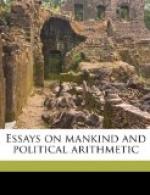And though the expedient of Fabius Maximus, to contract the strangers into four tribes, might be reasonable where the affairs of a whole empire were transacted by magistrates chosen in one city, yet the same policy may not hold good in England; foreigners cannot influence elections here by being dispersed about in the several counties of the kingdom, where they can never come to have any considerable strength. But some time or other they may endanger the government by being suffered to remain, such vast numbers of them here in London where they inhabit altogether, at least 30,000 persons in two quarters of the town, without intermarrying with the English, or learning our language, by which means for several years to come they are in a way still to continue foreigners, and perhaps may have a foreign interest and foreign inclinations; to permit this cannot be advisable or safe. It may therefore be proper to limit any new Acts of naturalisation with such restrictions as may make the accession of strangers not dangerous to the public.
An accession of strangers, well regulated, may add to our strength and numbers; but then it must be composed of labouring men, artificers, merchants, and other rich men, and not of foreign soldiers, since such fright and drive away from a nation more people than their troops can well consist of: for if it has been ever seen that men abound most where there is most freedom (China excepted, whose climate excels all others, and where the exercise of the tyranny is mild and easy) it must follow that people will in time desert those countries whose best flower is their liberties, if those liberties are thought precarious or in danger. That foreign soldiers are dangerous to liberty, we may produce examples from all countries and all ages; but we shall instance only one, because it is eminent above all the rest.
The Carthaginians, in their wars, did very much use mercenary and foreign troops; and when the peace was made between them and the Romans, after a long dispute for the dominion of Sicily, they brought their army home to be paid and disbanded, which Gesco, their General, had the charge of embarking, who did order all his part with great dexterity and wisdom. But the State of Carthage wanting money to clear arrears, and satisfy the troops, was forced to keep them up longer than was designed. The army consisted of Gauls, Ligurians, Baleareans, and Greeks. At first they were insolent in their quarters in Carthage, and were prevailed upon to remove to Sicca, where they were to remain and expect their pay. There they grew presently corrupted with ease and pleasure, and fell into mutinies and disorder, and to making extravagant demands of pay and gratuities; and in a rage, with their arms in their hands, they marched 20,000 of them towards Carthage, encamping within fifteen miles of the city; and chose Spendius and Matho, two profligate wretches, for their leaders, and imprisoned Gesco, who was deputed to them from




